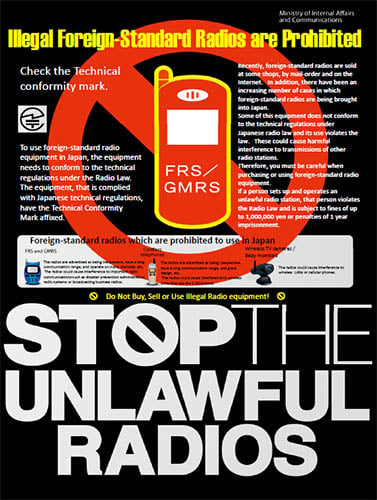Keeping in touch with friends or family on a cruise is easy if you're going to be purchasing an onboard WiFi package, but often guests look to handheld radios or "walkie-talkies" for a cheaper way to coordinate happenings on ever-larger ships with countless distracting events. This can certainly be an effective option for some, but you'll want to keep reading to learn about features, options, reasonable expectations, and a few "gotchas" before relying on two-way radios on your cruise. Warning, I'm an amateur radio operator, used to work in radio communications, and a bit of a nerd - but I'll try to keep things simple.

Radio Types
Generally speaking what you're going to buy for unlicensed use, as a consumer, are going to be Family Radio Service (FRS) radios in the US, or Personal Mobile Radios (PMR446) in the EU. The two are essentially the same product in concept, but they work on different frequencies, and cannot communicate with each other. Further, they're each on frequencies licensed for use only in the US or EU, respectively. In either case, the radios have similar restrictions, though for the purpose of the rest of this article, we'll be talking about the specifications for FRS radios.
- Power output. FRS radios are restricted to .5 watts or 2 watts, depending on the model and channel.
- Antennas. You can't attach larger or external antennas, as they're fixed.
- They operate mostly around 462MHz (this is the frequency range - think about the number of your favorite radio station).
With the above restrictions in mind, you're not going to find a special model or brand which has materially greater range than another. If you see a radio with different specifications (such as 5 watt output), that is a GMRS or other radio, which requires licensing.
Performance and Range
FRS radios on land may cover, in optimal conditions, a couple of miles - and that's pushing it. If you search online for these radios you'll see them advertising ranges of five, ten, even 35 miles - this is an absolute lie. It won't happen. Sometimes marketers work this into the ad in a way that suggests a significant range, but they really mean that you'll be able to pick up weather radio (if so equipped) from a great distance. Any given radio in this category will have the same range, provided you're comparing two models with the same output (again, some models output 2 watts on specific frequencies). On a ship, range will be greatly diminished.
The range of any radio is dependent on several primary factors:
- Antenna design
- Antenna height
- Power output
- Obstructions
As we already covered, the antennas and power output on these radios is restricted, and when you're using the radios to communicate with friends on a ship, you don't have much control over height. Obstructions are an important point, because on land radio range is often dictated by line of sight, but on a ship you will have obstructions. Steel hulls, watertight doors, flooring, miles of cabling, thousands of people, swimming pools, slot machines, furniture, plumbing, etc - these are all obstructions. Further, the electrical systems on ships can cause interference, which is a sort of electronic obstruction.
For the sake of understanding and ensuring realistic expectations, I'll point out that even radios used by police and fire departments don't have drastically greater range than these radios on their own. Police and fire departments, as well as some businesses use repeaters, and networks of repeaters, to greatly expand range in the same way in which cell sites work. Your cellphone can't get a signal to your friend on the other side fo the country, but infrastructure can, and FRS radios do not rely on any infrastructure.
Will FRS Radios Cover an Entire Ship?
Maybe. You'll find plenty of folks who have successfully used these radios on ships, and plenty of others who have had issues. Cruise ships today are larger than ever and have more electronics and metal structures to compete with. It's likely you'll have far better success using these radios on say, the 84k GT Disney Magic, than the 228k GT Harmony of the Seas. There are other variables too, like how many other people onboard are using said radios, which brings up another concern which is clouded by marketing: privacy.
Can Other People on the Ship Listen to My Conversation?
In short, absolutely. These radios are not intended to be secure or private in any way. You may see some radios that advertise a feature called "privacy codes" or something similar, but make no mistake, this feature helps reduce how much you hear other people not how much they hear your conversations. These codes are actually sub-audible tones which tell radios with that same tone to listen.

This means without using privacy codes, if you and I are both on channel one and anyone uses their radio on that channel, we'll hear them, regardless of their use of privacy codes. If you and I start using privacy code 024 (for example) on channel one, our radio's speakers will only turn on when someone is transmitting on that channel with that privacy code. This feature is certainly useful for reducing the amount of chatter you hear, but it doesn't make anything private. Further, if two people are speaking at the same time on the same frequency, and one is using your privacy code and the other isn't, you may still hear both of them simultaneously.
Again, just because this feature doesn't do anything at all to ensure privacy, don't dismiss it - it's a great feature to have, though generally comes at a cost. There are still some inexpensive options though, such as this set of two radios from Midland, which include the privacy code feature.
Is Using Radios on Cruise Ships Legal?
The laws around using various types of radio equipment while at sea can be somewhat complicated, but for the purposes of FRS (or PMR446) radios it's not something I'd personally worry about. Using these radios while in port though is another concern. The frequencies that the devices used are allocated for this type of casual unlicensed use only within the US (or EU for PMR446). Those frequencies may be used for other things in other countries. For example, some of the FRS frequencies in various parts of Europe are used for commercial and public safety voice communications. In many cases, you're not likely to hear anything on the channel even if you're interfering with communications, either because the channel you're on is the input channel for a system (not the output), or because the system you're causing interference to is digital (and thus sounds like regular static on a handheld radio).

While no major issue is likely, it is a less than ideal situation, for sure. In theory, a country could fine or prosecute someone for using unapproved equipment or equipment operating on a frequency they're not licensed for - but I'm quite confident you wouldn't actually see this play out from these radios, just making the point that spectrum is something carefully managed on a per-country basis.
Consider Guest Comfort
If you choose to use radios to keep in touch, do make sure your family keeps in mind the comfort of other guests. No one wants to be relaxing in a lounge, tanning poolside, or enjoying a meal with a view only to hear "Jimmy meet me at the cabin, I forgot my key!" screeching over a nearby radio. Many of these radios are capable of using headsets/earpieces, similar to wired sets used for cellphones. Some even have features that allow you to keep the volume turned down and have the radio vibrate when someone keys up using the same channel and privacy code. Whether with common sense or features, just keep in mind that messages important to you may not be quite as welcome to other guests.
Billy's Recommendation
Personally, I feel cellphones are frequently the most convenient way to keep in touch with your cruising party. If you don't want to splurge and pay for WiFi (note, you'll be fine with "social only" packages on lines that offer them), and the ship you're sailing on doesn't have a free messaging app, remember that many of us enjoyed cruises with family long before smartphone were even an option. While I offer caution and want to be sure people have reasonable expectations if opting to use radios on cruise ships, I can certainly appreciate their utility.
If you think this is the right way to go for your traveling party, I would look for radios which are water resistant, come with rechargeable batteries, offer privacy code functionality, and include a vibration alert feature. Motorola is likely to offer some of the highest quality devices, but that of course comes at a bit of a cost premium. I'd also look to avoid radios which are FRS/GMRS radios, only to reduce the chance of accidentally causing interference, but you can of course follow the instructions provided with the radios to not use those power settings, channels, and features.
Below are a few selections that stand out to me and might help you get started in your quest, but Amazon has scores of options from which to choose.
Have questions about staying in touch on your cruise? What's been your experience with two-way radios at sea? Comment below or reach out on Twitter or Facebook!

